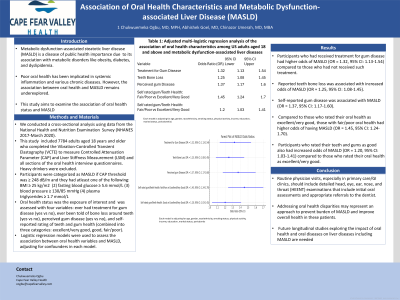Tuesday Poster Session
Category: Liver
P4666 - Association of Oral Health and Metabolic Dysfunction-associated Steatotic Liver Disease (MASLD): Analysis of Data From NHANES 2017-2020
Tuesday, October 29, 2024
10:30 AM - 4:00 PM ET
Location: Exhibit Hall E

Has Audio
- CO
Chukwuemeka E. Ogbu, MD, MPH
Cape Fear Valley Health
Fayetteville, NC
Presenting Author(s)
Chukwuemeka E. Ogbu, MD, MPH, Chinazor Umerah, MD, MBA
Cape Fear Valley Health, Fayetteville, NC
Introduction: Metabolic dysfunction-associated steatotic liver disease (MASLD) is a disease of public health importance due to its association with metabolic disorders like obesity, diabetes, and dyslipidemia. Poor oral health has been implicated in systemic inflammation and various chronic diseases. However, the association between oral health and MASLD remains underexplored. This study aims to examine the association of oral health status and MASLD.
Methods: This is a cross-sectional study using data from the National Health and Nutrition Examination Survey (NHANES) pre-pandemic data (2017-2020). The study population included 9658 adults aged 18 years and older who completed transient elastography assessment. MASLD and non-MASLD groups were defined according to consensus definitions used in prior studies. Oral health status was the exposure of interest and was assessed with four variables: ever had treatment for gum disease (yes vs no), ever been told of bone loss around teeth (yes vs no), perceived gum disease (yes vs no), and self-reported rating of teeth and gum health (combined into three categories: excellent/very good, good, fair/poor). Logistic regression models were used to assess the association between oral health variables and MASLD, adjusting for confounders in each model.
Results: Participants who had received treatment for gum disease had higher odds of MASLD (OR = 1.32, 95% CI: 1.13-1.54) compared to those who had not received such treatment. Reported teeth bone loss was associated with increased odds of MASLD (OR = 1.25, 95% CI: 1.08-1.45). Self-reported gum disease was associated with MASLD (OR = 1.37, 95% CI: 1.17-1.60). Compared to those who rated their oral health as excellent/very good, those with fair/poor oral health had higher odds of having MASLD (OR = 1.45, 95% CI: 1.24-1.70). Participants who rated their teeth and gums as good also had increased odds of MASLD (OR = 1.20, 95% CI: 1.03-1.41) compared to those who rated their oral health as excellent/very good.
Discussion: Routine physician visits, especially in primary care/GI clinics, should include detailed head, eye, ear, nose, and throat (HEENT) examinations that include initial oral assessments and appropriate referrals to the dentist should be made. Addressing oral health in these settings will help mitigate the burden of MASLD. Future longitudinal studies exploring the impact of oral health and oral diseases on liver diseases including MASLD are needed.
Disclosures:
Chukwuemeka E. Ogbu, MD, MPH, Chinazor Umerah, MD, MBA. P4666 - Association of Oral Health and Metabolic Dysfunction-associated Steatotic Liver Disease (MASLD): Analysis of Data From NHANES 2017-2020, ACG 2024 Annual Scientific Meeting Abstracts. Philadelphia, PA: American College of Gastroenterology.
Cape Fear Valley Health, Fayetteville, NC
Introduction: Metabolic dysfunction-associated steatotic liver disease (MASLD) is a disease of public health importance due to its association with metabolic disorders like obesity, diabetes, and dyslipidemia. Poor oral health has been implicated in systemic inflammation and various chronic diseases. However, the association between oral health and MASLD remains underexplored. This study aims to examine the association of oral health status and MASLD.
Methods: This is a cross-sectional study using data from the National Health and Nutrition Examination Survey (NHANES) pre-pandemic data (2017-2020). The study population included 9658 adults aged 18 years and older who completed transient elastography assessment. MASLD and non-MASLD groups were defined according to consensus definitions used in prior studies. Oral health status was the exposure of interest and was assessed with four variables: ever had treatment for gum disease (yes vs no), ever been told of bone loss around teeth (yes vs no), perceived gum disease (yes vs no), and self-reported rating of teeth and gum health (combined into three categories: excellent/very good, good, fair/poor). Logistic regression models were used to assess the association between oral health variables and MASLD, adjusting for confounders in each model.
Results: Participants who had received treatment for gum disease had higher odds of MASLD (OR = 1.32, 95% CI: 1.13-1.54) compared to those who had not received such treatment. Reported teeth bone loss was associated with increased odds of MASLD (OR = 1.25, 95% CI: 1.08-1.45). Self-reported gum disease was associated with MASLD (OR = 1.37, 95% CI: 1.17-1.60). Compared to those who rated their oral health as excellent/very good, those with fair/poor oral health had higher odds of having MASLD (OR = 1.45, 95% CI: 1.24-1.70). Participants who rated their teeth and gums as good also had increased odds of MASLD (OR = 1.20, 95% CI: 1.03-1.41) compared to those who rated their oral health as excellent/very good.
Discussion: Routine physician visits, especially in primary care/GI clinics, should include detailed head, eye, ear, nose, and throat (HEENT) examinations that include initial oral assessments and appropriate referrals to the dentist should be made. Addressing oral health in these settings will help mitigate the burden of MASLD. Future longitudinal studies exploring the impact of oral health and oral diseases on liver diseases including MASLD are needed.
Disclosures:
Chukwuemeka Ogbu indicated no relevant financial relationships.
Chinazor Umerah indicated no relevant financial relationships.
Chukwuemeka E. Ogbu, MD, MPH, Chinazor Umerah, MD, MBA. P4666 - Association of Oral Health and Metabolic Dysfunction-associated Steatotic Liver Disease (MASLD): Analysis of Data From NHANES 2017-2020, ACG 2024 Annual Scientific Meeting Abstracts. Philadelphia, PA: American College of Gastroenterology.

